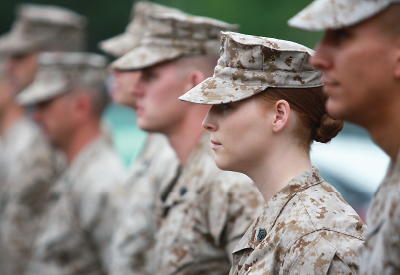Military Service Can Affect Women’s Mental Health
Abstract
A military psychiatry expert advises mental health professionals to ask patients whether they served in the Armed Forces.
A woman’s experience in the military can be very different from a man’s—a point psychiatrists should consider when treating patients who are service members or veterans, according to a former Army psychiatrist and expert on military women’s health.

“The military experience is heightened when you’re a female—you stand out, and you’re noticed. It’s like living in a glass bowl,” said retired Army Col. Elspeth Cameron Ritchie, at APA’s 2017 Annual Meeting in San Diego. Ritchie is a professor of psychiatry at the Uniformed Services University of the Health Sciences in Bethesda, Md., and the mental health chief at the Community-Based Outpatient Clinics for the Washington, D.C., Veterans Administration.
Ritchie is the co-author of Women at War, which was published in June 2015. Her latest book is Psychiatrists in Combat: Mental Health Clinicians’ Experiences in the War Zone, in which she serves as one of the editors for 22 first-person accounts of war through the eyes of mental health professionals, including psychiatrists, psychologists, and occupational therapists.
Women now comprise about 15 percent of the U.S. Armed Forces, compared with 2 percent in 1973. Even with more than 300,000 women deployed since September 11, 2001, accommodations for women service members remain inadequate, said Ritchie.
Women service members must figure out such activities of daily living as how to manage their hygiene, when and where to take a shower, and where to sleep and eat in harsh environments, she said.
Women service members may find themselves stationed as the lone woman among a group of men, having to adapt their everyday female habits, according to Ritchie, a long-time Army psychiatrist who has deployed to Iraq, South Korea, Guantanamo Bay, and Somalia. Women who are traveling in convoys may not be able to leave the vehicle for long periods because of roadside bombs and the possibility of being shot, she said.
In addition to feeling socially isolated, women in the military can face other intimate issues during deployment, including sexual health concerns, exposure to sexual trauma, and unwanted pregnancy.
Unintended pregnancy is one of the most difficult and life-changing challenges facing women in uniform, Ritchie said. “When this happens to a young woman, it’s harder for her to maintain her military career, and she may have to drop out of the military.”
It’s important for psychiatrists to ask patients if they have served in the military, Ritchie emphasized. “Be aware that veterans come in all shapes and sizes. They may not volunteer this information. If they’re a veteran, it can help to engage them around their military experience.” ■



